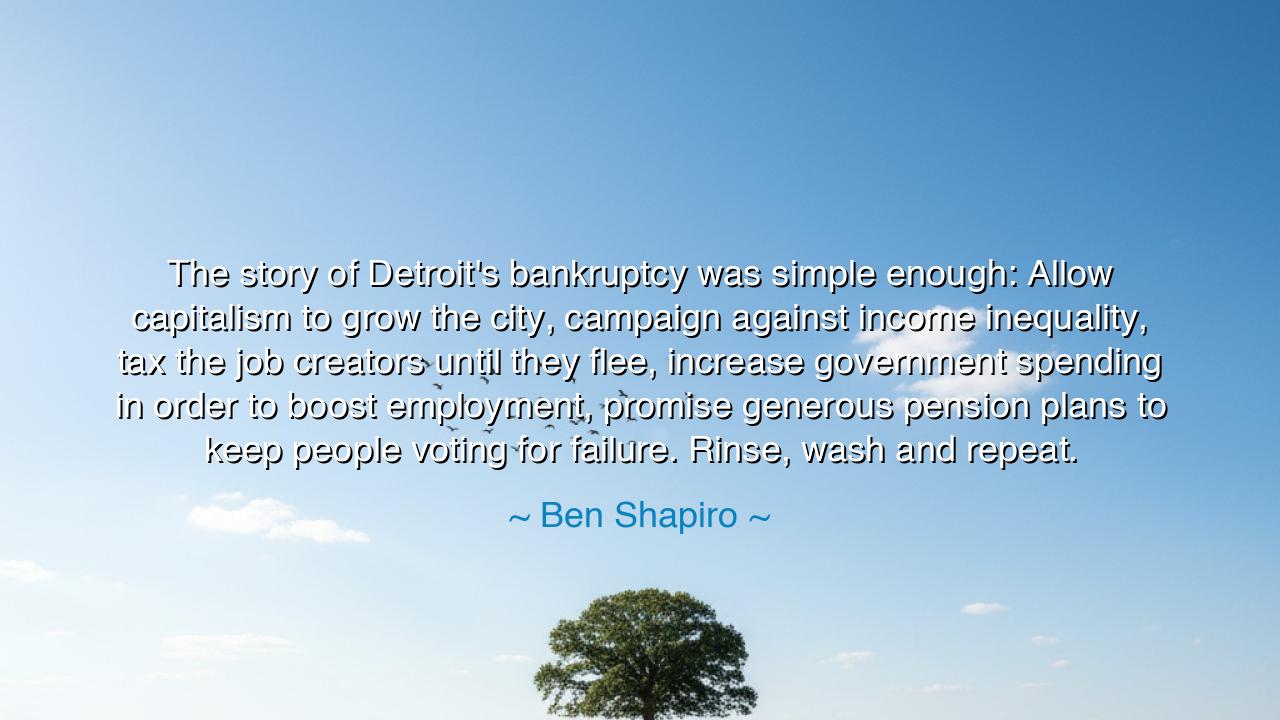
The story of Detroit's bankruptcy was simple enough: Allow
The story of Detroit's bankruptcy was simple enough: Allow capitalism to grow the city, campaign against income inequality, tax the job creators until they flee, increase government spending in order to boost employment, promise generous pension plans to keep people voting for failure. Rinse, wash and repeat.






Host: The room was quiet, the light from the window fading as dusk settled over the city. The air felt still, the evening bringing a sense of introspection. Jeeny sat at the table, her hands folded in front of her, the weight of a thought hanging in the air. Jack, standing by the window, stared out at the world, his arms crossed, the weight of the conversation just beginning to form.
Jeeny: (softly, breaking the silence) “I read something by Ben Shapiro today that made me think. He said, ‘The story of Detroit's bankruptcy was simple enough: Allow capitalism to grow the city, campaign against income inequality, tax the job creators until they flee, increase government spending in order to boost employment, promise generous pension plans to keep people voting for failure. Rinse, wash and repeat.’ What do you think about that?”
Jack: (pauses, his voice thoughtful) “That’s a pretty harsh take, isn’t it? But I see where he’s coming from. He’s pointing out the cycle that happens in places like Detroit—where economic policies clash, where things like over-taxation and overspending create an environment that ultimately drives businesses and jobs away. It’s easy to blame capitalism, but sometimes, the way we regulate and tax businesses can actually kill growth.”
Jeeny: (nodding slowly) “Right, he’s saying that the cycle of failure is almost self-perpetuating. The city allows capitalism to build and bring wealth, but then reacts with policies that stifle that growth—over-taxing businesses and overpromising to citizens. There’s this disconnect between idealism and practicality, where people expect to live with the benefits of capitalism without fully understanding the consequences when that system is burdened by unsustainable policies.”
Host: The quiet between them deepened as the weight of the conversation settled in. The evening seemed to reflect the tension of the topic—an exploration of the complexity of economic policies, and how they interact with the lives of individuals. The world outside seemed to slip away, leaving the two of them in a space where the discussion of Detroit’s rise and fall, its systemic issues, became a larger question about the balance between capitalism, government regulation, and social promises.
Jack: (his tone softer now, more reflective) “It feels like we’re always stuck in that cycle—people want progress, but they also want to protect the systems they’re used to. But when the promises of the system become too much, when the government promises too much, it’s hard to keep it sustainable. That’s what happened in Detroit, right? Overpromise, overregulate, and eventually, the system starts to crumble under its own weight.”
Jeeny: (thoughtfully) “Exactly. And the most frustrating part of it is that the people who end up suffering the most are the ones who need the help the most. The workers, the retirees, the citizens who were promised more than the city could deliver. It’s a cycle of failure, and yet, the same policies get repeated because the focus is often on the short-term solutions, not the long-term consequences.”
Jack: (sighing, his voice heavier now) “It’s hard to look at a city like Detroit and not feel like the system has failed them. But at the same time, there’s this resentment toward businesses for fleeing, for not sticking around to deal with the issues. It’s like everyone’s pointing fingers, but no one is really looking at the deeper problem of how these cycles keep happening.”
Jeeny: (with a quiet nod) “That’s the challenge, isn’t it? The imbalance. The tension between growth and sustainability, between progress and the systems we put in place to support it. It's like we're constantly caught between wanting to move forward and wanting to protect what we already have. And that’s where the failure comes in—when the balance tips too far one way.”
Host: The stillness between them deepened, the conversation having shifted into something broader, more philosophical. The complexity of Detroit’s bankruptcy was no longer just a case study—it had become a metaphor for a larger systemic issue. The weight of Jeeny and Jack’s words hung in the air, as if both were reflecting on how easy it is for a system to fall into a cycle of failure, no matter how well-intentioned the policies may be.
Jack: (after a long pause, his voice more resolved) “Maybe the answer isn’t in fighting one side or the other—it’s in finding a balance. A way to create growth while also making sure the promises we make are sustainable, and not just a quick fix.”
Jeeny: (smiling softly) “Yes. It’s about long-term solutions. It’s about balancing ambition with practicality, and understanding that real progress isn’t just about numbers or promises—it’s about building systems that can stand the test of time.”
Host: The quiet in the room felt different now, as if something had clicked into place. The conversation had evolved, from an exploration of Detroit’s bankruptcy to a deeper reflection on the nature of progress, growth, and responsibility. Outside, the world had darkened, but inside, the realization that balance was key to avoiding cycles of failure hung in the air. Both Jeeny and Jack had come to understand that success wasn’t about promising the impossible—it was about creating solutions that could truly last.






AAdministratorAdministrator
Welcome, honored guests. Please leave a comment, we will respond soon